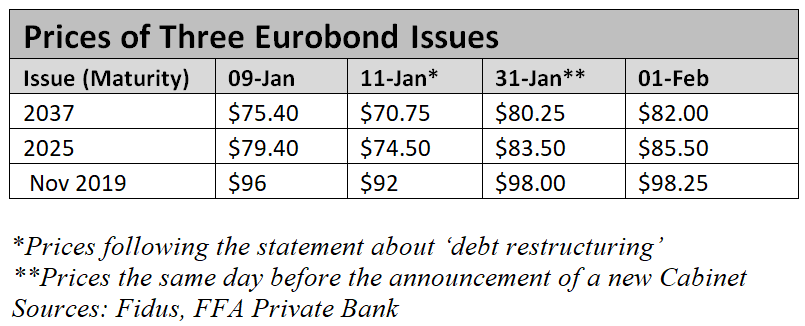Eurobonds surge
following Cabinet formation
Beirut Stock Exchange remains dormant awaiting clearer vision
| Share |
|

|
|

|
|
|
|
Prices of Lebanese dollar-denominated sovereign bonds have surged following the formation of the new Cabinet.
Eurobonds maturing in 2037 rose 2.2 percent to $82 on Feb. 1 compared with their price on the morning of Jan. 31 before the announcement of the Cabinet formation. The 2025 issue of the Eurobonds increased 2.4 percent over the same period.
Eurobond prices, which plunged on Jan.11 following a statement by the Minister of Finance about a possible restructuring of public debt, continued to improve since then following reassurances by top officials and Saudi and Qatari declarations about their readiness to support Lebanon.

Solidere shares, which are usually the most sensitive to political developments, rose on Feb. 1 by 1.35 percent for the ‘A’ shares and 1.71 percent for the ‘B’ shares. Yet this remains a significant improvement (an increase of 12 percent) from their value following the ‘debt restructuring’ controversy.
The shares of listed banks traded at very low volumes. Trading was confined to preferred shares of Bank of Beirut and Byblos Bank as well as the GDRs of BLOM Bank. Only the shares of Byblos increased closing higher 0.74 percent.
Faysal Barbir, Director-Capital Markets at FFA Private Bank said that activity on the Beirut Stock Exchange (BSE) remains very weak, with meager trading volumes as investors are adopting a cautious stance and are not excited to invest because of multiple disappointments in the past. Only 25,222 Solidere ‘A’ shares changed hands. “This is low by any standard,” he said.
Investors on the BSE are waiting for clear developments in order to participate in the relief rally, they consider a new Cabinet as the first step, and that the bulk of the work is yet to come, Barbir said.
According to Barbir, the yield curve on the Eurobonds is flattening after it was inverted for nearly one year due to concerns over political uncertainties in Lebanon. The yield will normalize in the future if the reforms are implemented and the political and economic conditions improve, he said.
In normal times, the yield increases in line with maturities—the longer the maturity the higher the yield. In times of distress, bonds with short-term maturities are perceived by investors as more risky for liquidity reasons, Barbir said.
The five-year Credit Default Swap (CDS) for Lebanon dropped back to 700 basis points (bps) after hitting a high 900 bps at the peak of the crisis triggered by the statement about the so-called ‘debt restructuring’. A lower CDS reflects a decrease in the cost of insuring a debt.
Reported by Shikrallah Nakhoul
Date Posted: Feb 01, 2019
| Share |
|

|
|

|
|
|
|